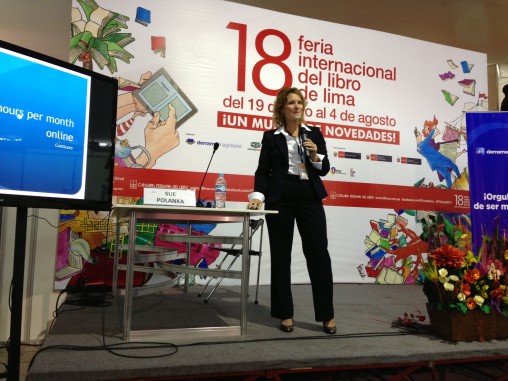
Sue Polanka, head of reference and instruction for the Wright State Libraries shared her e-book expertise with a large crowd at the International Lima Book Fair.
Picture a librarian and what do you see? Many imagine a bespeckled individual sitting behind a desk, sorting books according to the Dewey Decimal System and occasionally running around labyrinths of bookshelves, saying “Sshh!”
But for Sue Polanka, her position as head of reference and instruction for the Wright State Libraries has launched her around the globe time and time again. Polanka spent the last week of July in Lima, Peru, as a featured speaker at the Lima International Book Fair.
The 18th edition of the Lima International Book Fair took place July 19 through August 4 and featured more than 800 activities and over 300 stands. The fair offered numerous book presentations, sales and engaging cultural activities.
Invited by the U.S. Embassy in Lima, Polanka gave a presentation on the advantages and benefits of e-books—a subject in which Polanka is beyond well-versed. Her vast knowledge of electronic book economics makes her not only Wright State’s e-book guru, but also an indispensable part of print’s recent push to digital.
This made Polanka something of a black sheep at the fair.
“Print books dominated,” said Polanka. “Myself and the U.S. Embassy were there to discuss the opportunities with e-books and tablet devices. For many Peruvians, it was the first they had seen a tablet—Peruvians love their print!”
But over the last few decades, e-books and digital publications have been taking libraries across the world by storm. According to Polanka, it all started when library catalogs went digital in the late ’80s. Once the Internet hit in 1993, libraries began offering access to the World Wide Web and more extensive online catalogs, databases and digital journals. Academic journals and scholarly monographs followed.
The rest is history; nearly all the world’s publications exists in the digital threshold.
Polanka believes that print and digital publications can co-exist harmoniously. This was the general message behind her presentation as part of a seminar for educators at the Lima International Book Fair.
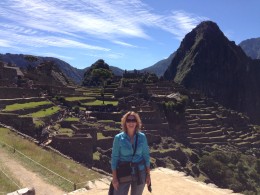
Polanka's job at Wright State allows her to travel the world. This is her in front of Machu Picchu, the famous Incan ruin.
“Both have opportunities and challenges,” said Polanka. “Librarians and educators need to do what is best for their communities. Being aware of one’s options and the benefits of different formats is important for educators.”
In addition to Polanka’s presentation on the value of digital publications in academia, the U.S. Embassy had a booth at the fair that displayed and spotlighted the evolution of the book. The booth featured an array of devices—the iPad, Google Nexus, and Kindle FIRE—displaying books, games, websites and other educational resources.
Polanka considers herself to be a strong proponent of bringing literature further into the digital age.
“I like to see libraries moving forward,” said Polanka. “I’ve always welcomed new technology, concepts and ways of doing things. I’m open to change and progress, even if it means failing and learning from our mistakes as we move on.”
To learn more about how e-books are sweeping the academic and literary realms, visit Polanka’s blog, No Shelf Required.
- Polanka’s job at Wright State allows her to travel the world. This is her in front of Machu Picchu, the famous Incan ruin.
- The U.S. Embassy put a number of tablet devices on display for book fair attendees to try.
- Sue Polanka, head of reference and instruction for the Wright State Libraries shared her e-book expertise with a large crowd at the International Lima Book Fair.

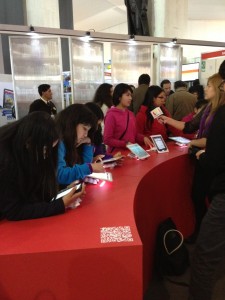

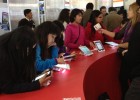
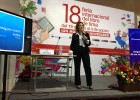
 Wright State business professor, alumnus honored by regional technology organizations
Wright State business professor, alumnus honored by regional technology organizations  Wright State University Foundation awards 11 Students First Fund projects
Wright State University Foundation awards 11 Students First Fund projects  Gov. DeWine reappoints Board Treasurer Beth Ferris and names student Ella Vaught to Wright State Board of Trustees
Gov. DeWine reappoints Board Treasurer Beth Ferris and names student Ella Vaught to Wright State Board of Trustees  Joe Gruenberg’s 40-Year support for Wright State celebrated with Honorary Alumnus Award
Joe Gruenberg’s 40-Year support for Wright State celebrated with Honorary Alumnus Award  Wright State’s elementary education program earns A+ rating for math teacher training
Wright State’s elementary education program earns A+ rating for math teacher training 